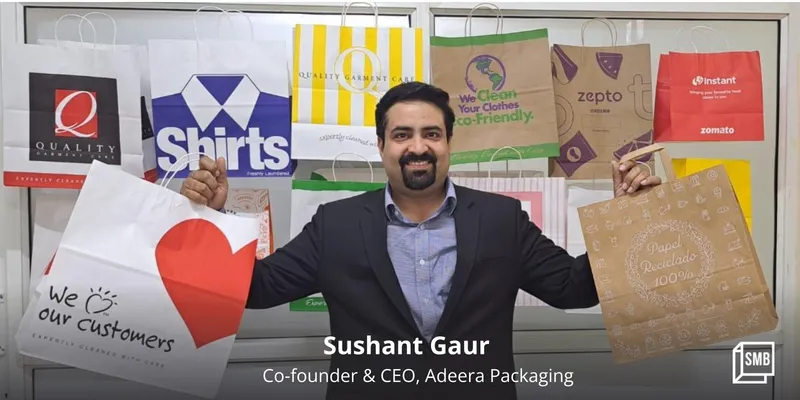How SMEs are betting on plastic alternatives and other top stories of the week
From paper bags to dry coconut leaves straws, here’s how SMEs in India are solving plastic waste problems.
Over the past five years, plastic waste generation has quadrupled in India.
The good news is that Indian MSMEs have taken charge to bring plastic alternatives to the fore, playing a crucial role in reducing plastic waste in the country.
This week SMBStory spoke to entrepreneurs who have launched plastic alternatives brands. Here are their stories:
Adeera Packaging

In 2012, just after completing his MBA course, Sushant Gaur started his own business in Noida. He invested Rs 15 lakh to start , which manufactured paper bags. The founder envisioned strong growth as demand for paper bags was emerging alongside rising awareness on ditching plastic.
The idea was good, but convincing people to adopt paper over plastic was tough. He recalls going door-to-door to pharmacies, sweet shops, and local kiranas to sell his product in the initial days.
But things changed in the years that followed as Sushant bagged big clients like Fortis Hospital, Indian Railways, and Bikanervala. By 2019, Urja Packaging was making a turnover of Rs 3.5 crore.
Sushant says that while business growth was doubling every year, it wasn’t “substantial”.
Sushant revamped Urja Packaging and relaunched it as after joining hands with Atulya Bhatia (the long-term client) and his childhood friend Ashish Agarwal, now directors of the company.
The trio reworked business strategies and got down to work. Despite the pandemic, Adeera Packaging registered 10X growth and clocked a revenue of Rs 23.5 crore in FY22.
Sushant says the company has bagged more than 200 clients, including Zepto, Apollo, KFC, Taco Bell, Dunkin Donuts, Food Darzee, and Nike in India. It has also added several international clients to its portfolio.
Sunbird Straws

Five years ago, Saji Varghese, an associate professor of English at Christ university in Bengaluru, was on a walk around the university campus when his attention fell on a dry coconut leaflet that had fallen on the ground.
Just the day before, Saji had a conversation with a guest from the Netherlands on the impact of single-use plastic. So, when he spotted the dry leaflet, he had an “epiphany moment”, as he calls it, which sowed the seeds of Sunbird Straws.
The dry leaflet, which would have been immaterial to many, struck as an opportunity to Saji. He thought it could be converted into an eco-friendly alternative to plastic straws to create a "positive impact" on the environment—something he had always been mulling over.
Thus began his experiments with dry coconut leaflets.
Three years later, in 2020, the professor started to manufacture drinking straws made from naturally dried coconut leaves.
Currently, the company produces around 6,000 straws a day. Every month, it produces close to two lakh straws. By the first quarter of 2023, Sunbird aims to produce 15 lakh straws per month.
Other top picks of the week:
MSME Lending Report 2022
The micro, small, and medium enterprises (MSME) sector in India comprises 63.4 million businesses which contribute 30% to India’s GDP. While MSMEs are considered as the backbone of the economy, it struggles with lending challenges majorly in the form of working capital.
The BlinC Invest report reflects that the MSME sector has a total credit demand of Rs 69.3 trillion, growing at a compounded annual growth rate (CAGR) of 11.5%. with less than 15% of the demand being catered by formal sources. The report identifies key opportunities while proposing business models best suited to cater to this demand.
While quarterly MSME disbursements have grown 2x over the last two years, this is primarily on account of increased credit penetration and not on account of additional risk taken by the financial institutions. This is indicated by the fact that approval rates for the medium risk tier segment have remained unchanged, hovering around 30%-35% for private banks in the last one year and have decreased for PSUs and NBFC over the last 2 years.
“Private banks have been at the forefront of lending to MSMEs followed by NBFCs. PSUs with their branch network and NBFCs with their Feet-on-Street network can help further drive financial inclusion in Tier 3/4 towns and villages in the country,” the report mentions.







